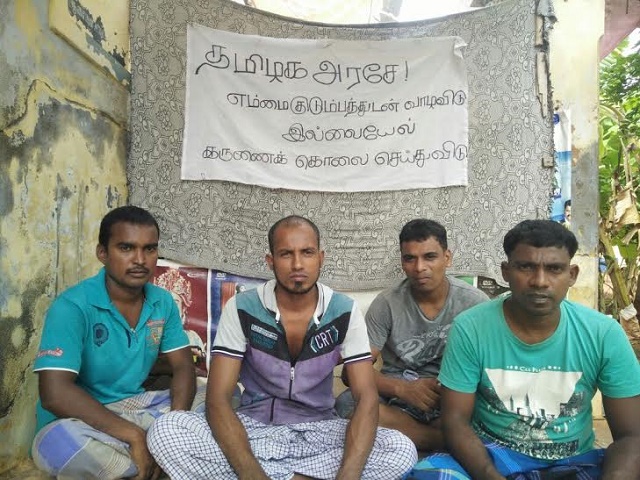by N. Malathy, ‘Economic & Political Weekly,’ Mumbai, April 1, 2017
EPW-Shadow Prisons by N. Malathy April 2017

“Government of Tamil Nadu, let us live with our families or give us a mercy killing.” June 2016. Photo courtesy TamilCNN.ca
These Tamil Eelam refugees are categorised
into three types—non-camp refugees,
open camp refugees, and “special
camp” refugees. Non-camp refugees are
people with sufficient resources to live
on their own in rented places. They have
received little attention from activists,
researchers or the media, perhaps justifi
ably. Open camp refugees live in more
than a hundred camps scattered across
Tamil Nadu. These camps have received
some attention, the conditions therein
described in terms ranging from inadequate
to horrid. This article intends to
throw some light on the so-called special
camps, which have received very little
attention…
Also, the very first special camp
was created in Vellore in Tamil Nadu
following the IPKF episode, purportedly
to hold Tamil Eelam militants. Our story
starts at this juncture.
The manner in which the Eelam Tamils
suspected of being militants were brought
to this Vellore special camp did not bode
well for what was to follow. The first batch
of inmates was taken there on a fake
promise of employment and locked up.
The Eelam Tamils, in captivity, began protesting.
When their hunger strike did not
lead to talks, the angry inmates set fire
to the “prison” gate and threw stones at
the police who arrived. The police opened
fire killing two of them. Thus began the
25-year long history of special camps for
the Eelam Tamils. Following the assassination
of Rajiv Gandhi, successive Tamil
Nadu governments continued to open
more special camps, in Chengalpattu,
Poonamallee, Pudukkottai, Meloor, Thiruchchi,
Thiruvaiyaru, Athipatti, and Palani
and in other areas. All of these special
camps, except one, have been closed
over the years. Today, one camp exists in
Thiruchchi with 21 Tamil Eelam refugees,
many of whom have been held for
many years. This Thiruchchi special
camp is located within the Thiruchchi
prison complex…
Some Common Threads
The special camps have been entirely
under the control of the Tamil Nadu
government. This is the same government
that is supposedly confronting the
central government in the courts regarding
the release of the seven accused
in the Rajiv Gandhi assassination case.
It is a contradiction and a puzzle that
needs to be reflected upon.
More than seven years after the end of
the war in Sri Lanka, these cruel special
camps are continuing. The views among
the lawyers and activists who have agitated
for the release of the Eelam Tamils
from the special camps have some common
threads. It is seen as an easy way of
muzzling the open camp refugees who
may protest about abuse and inadequacies
in the open camps as has been described
in one case. Activists also believe that
the central and the state governments
use the existence of special camp inmates
as proof that Tamil Tigers are still active in
India and therefore, their proscription
must continue. The Indian authorities may
be unable to provide evidence to maintain
the proscription of Tamil Tigers in the
Supreme Court, and so the continuation
of the proscription on Tamil Tigers is
ruled by a special tribunal appointed by
the central government.
Note
1 Concentration Camps of Tamil Nadu: The Socalled
Special Camps, by Tholar Balan (translated
by M S Thambirajah), Tholar Press, 2015